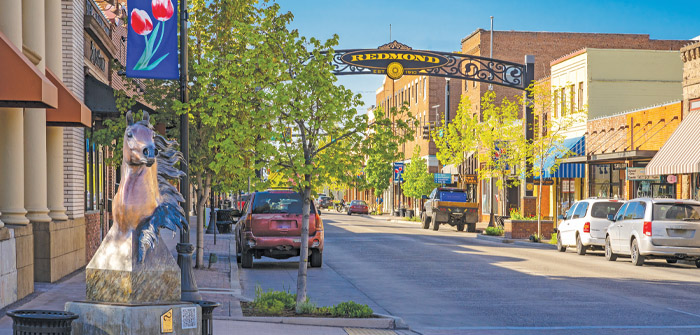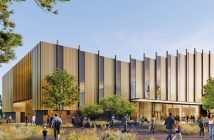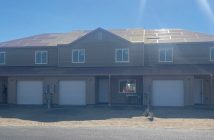(Downtown Redmond | Photo courtesy of Redmond Chamber of Commerce)
More than a decade ago, community, business and city leaders created a clear plan for what they wanted to see happen in Redmond, including making the city economically sustainable. “Redmond’s success as a community is due to the partnerships between local leaders and inviting people to have their voices heard about what they want for Redmond,” City of Redmond Economic Development/Urban Renewal Program Manager Chuck Arnold said. “I feel like the Redmond community has been thoughtful about what we want for our city and how we want to grow.”
Leaders carefully took into consideration how to manage growth, while working to maintain Redmond’s small-town ambiance.
Arnold said local leaders are working to encourage investments in Redmond’s business community, create new housing and ensure good-paying jobs. “Our goal is for people to see that Redmond is a great investment,” Arnold said, “whether they live or work here.”
From Urban Renewal to housing projects to recruiting new traded-sector and commercial businesses, Arnold said there is careful consideration about what is in the best interest and investment for the city’s overall health.
City of Redmond
Deputy City Manager John Roberts said gaining a comprehensive picture of development in Redmond requires looking at capital improvement projects, residential construction, the Redmond Airport, industrial and commercial projects and urban renewal and downtown developments.
The City of Redmond had recently projected that by 2040, the city would grow to 50,000 residents or 900 new residents per year. However, in the last three years, the city has been experiencing a significantly accelerated growth rate and could reach 50,000 residents as soon as 2027. As of July 2022, the city’s population was 37,342 which equates to 2,800 new residents a year in the last three years.
To accommodate for the growth, Roberts said there needs to be comprehensive planning and coordination for public facilities, needed housing, transportation and the urban growth boundary.
Roberts said there has been a decrease in the number of building inspections from an average of 83 per day in 2021 to an average of 62 per day in 2022. “Single-family residential permits are significantly down this year,” Roberts said. “Multifamily permits are up, and commercial and industry permits are steady.”
The City of Redmond issued 19 commercial permits in 2019; 42 in 2020; 18 in 2021 and 19 in 2022. New commercial and industrial developments include Red Rock Plaza, Leading Edge Jet Center, Medline and Oregon Industrial.
There were 364 single-family dwelling permits in 2019; 548 in 2020; 457 in 2021 and 156 in 2022. For multi-family dwelling units, there were 415 in 2019; 197 in 2020; 156 in 2021 and 140 in 2022.
Roberts said the City of Redmond and REDI continue to receive constant requests for information from people interested in facets of commercial, industrial and residential developments. “On any given day, we can interact with a development team representing a Fortune 500 company to a local downtown business owner trying to expand,” Roberts said. “Simply, there is an incredibly diverse set of interests wanting to do business in Redmond.”
Roberts attributes the city’s successes to the great planning work conducted during the last two decades. “These planning efforts were visionary and created the opportunities for developable lands or opportunities currently available in the city,” Roberts said. “Moreover, these plans were carefully coordinated with the city’s rolling five-year capital improvement programming. The coordinated efforts paid off.”
Roberts shared specific examples of the planning efforts to include Desert Rise Industrial Park, regional large lot industrial parcels, mixed-use live/work zone, Downtown Overlay District, Downtown Urban Renewal Areas and five Sub-Area Land Use Area Plans.
“These planning efforts guided, shaped and laid the foundation for the recently adopted Redmond Comprehensive Plan 2040, Community Vision and accompanying land use/zoning map,” Roberts said. “Without these plans, the city’s investments in infrastructure would not have been as synchronized or strategic, which would have ultimately encumbered the growth and economic development opportunities seen over the last five years.”
Relocating to Redmond
Jeremy Herauf is the owner and president of Bridge Masters, Inc., which operates three companies within the bridge infrastructure industry including Bridge Masters, Inc., Bridge Masters Rentals, and Titan Manufacturing. Their customers range from the Federal Government to private ownerships, currently covering all of North America.
“We don’t build bridges,” Jeremy said. “We have a specialty construction service that installs, maintains, repairs, designs and inspects utilities on bridges. We service all utilities including, water, sewer, gas, electric and telecommunications
His father, Allan Herauf, bought the company in 2002 and sold it to Jeremy in 2015. “We have been located in the Alfalfa area for 15 years but found we needed to move because we had outgrown our location,” Jeremy said. “We purchased a five-acre parcel in Redmond where we are building a 26,000-square-foot facility to house all three companies as well as an onsite test bridge.”
Several factors led Jeremy to relocate in Redmond including finding land at a reasonable price, close proximity to its vendors, Highway 97 and the Crooked River Bridge and an experienced workforce. “It’s important we have employees who are well-rounded and can do a little bit of everything from helping with sales to equipment work,” Jeremy said. “The combination of the Redmond School District and Central Oregon Community College training students in the skills we need made a difference.”
The company plans to move to its new location in April of 2023. “Working with REDI and the City of Redmond made a difference too because they understood our company and found ways to work with us in purchasing the land,” he said. “Redmond has a great diversity of companies that we can work with to build our projects and keep business in Redmond.”
Jeremey said having the Redmond Airport nearby also helps because customers fly from throughout the United States to visit Bridge Masters to be trained on its equipment.
Urban Renewal Projects
More than ten years ago, the SCP Redmond Hotel was a vacant building, slowly deteriorating in the heart of downtown Redmond.
Thanks to a shared vision by community, city and business leaders, today the SCP Redmond Hotel is once again a gathering place for local residents and tourists, reminiscent of how it was when it opened in 1928. The four-story building has a rooftop bar, 49 guest rooms and suites, a restaurant, gift store and workout facility. The renovations were made possible through a public-private partnership between the City of Redmond and developer Ken Cruse, CEO and co-founder of Alpha Wave.
Alpha Wave Investors acquired the historic Georgian revival building in 2017.
The City of Redmond provided a $3.5 Million urban renewal loan to the hotel’s renovations. A property of Soul Community Planet, the SCP Redmond Hotel received a $12 million renovation. “The community via the Urban Renewal Agency identified the reopening of the historic hotel property as the top catalytic project in the renewal plan for downtown. When the SCP Redmond Hotel opened in 2020, it was really inspirational because it helped Redmond reach for something bigger and better than what it had been doing to have a full-service boutique hotel in downtown Redmond,” Arnold said. “The success of the hotel as a business has helped both the operator and the community realize a significant return on investment. The reactivated hotel has led other businesses on Sixth Street to make investments and improvements to their buildings.”
Roberts said the SCP Hotel Redmond is just one example of how the City of Redmond has seen an increased interest in its Urban Renewal Program, leading to the development in Redmond’s Downtown Area at an all-time high. From the Central Oregon Medical Specialists Building to the High Desert Music Hall, Eqwine Bar to General Duffy’s Waterhole, there have been 300 completed downtown projects in Redmond since 2013, resulting in 88 percent downtown occupancy and $98 million increase to the tax base.
Arnold said Wild Ride Brewing was an early adopter of the Urban Renewal Program when it repurposed an old lumber yard into its brewery. “The Urban Renewal Program is also looking at improving infrastructure along South Highway 97 in order to improve freight mobility, attract new businesses to the land south of the fairgrounds and create new jobs,” Arnold said.
Arnold is optimistic about Redmond’s future, including its assets of available land for residential, commercial and industrial developments and the airport. There are plans for a new wetlands complex to filter wastewater, a new public safety building and a new library. “As the city evolves, we will continue to be thoughtful about the type of growth happening in Redmond,” he said, “keeping in mind we want Redmond to retain the small-town feeling the community highly values.”
Redmond Chamber of Commerce
Eric Sande is the executive director for the Redmond Chamber of Commerce and Visitor’s Center. “Redmond is a family-centric, pro-business community, where businesses and the community look out for each other,” Sande said. “It is a neighbor-helping-neighbor community.”
He said Redmond is able to attract and retain businesses because it is centrally located. “Being located in the geographic center of Central Oregon, businesses are able to attract talent from communities in every direction, Madras to the North, Prineville to the East, Bend to the South and Sisters to the West.”
Redmond has had a host of new businesses open in 2022, including Marshalls, Ross Dress for Less, Blue Sky Family Dentistry, Otto’s Landing and Selco Bank.
Sande said the national trend of finding employees and affordable housing definitely impacts Redmond businesses. And as inflation hits the United States, Redmond will be faced with the same financial challenges as consumers have to adjust their spending patterns to buy essential goods and services. “The Redmond Chamber will continue to work with member businesses and the community to navigate any challenges that come our way in 2023,” Sande said. “The Chamber provides networking opportunities, works with the Enjoy Downtown Redmond group and promotes shop local and other opportunities that showcase why Redmond is a great place to live, work and play. We will continue to advocate for businesses if and when challenges arise.”
Redmond Economic Development Inc. or REDI
Steve Curley became the executive director of Redmond Economic Development Inc., or REDI in March. A long-time resident of Central Oregon, Curley shared he is familiar with the region and Redmond. “What excites me the most about working for REDI is that Redmond is a family-oriented community,” Curley said. “I love the fact I will be working with traded-sector companies that provide good-paying jobs to support families who live in Redmond or nearby communities.”
REDI assists 130 firms on average each year including in 2022 Traeger’s Wood Fired Grills, Eberhard’s Dairy Products, Gompers Gin, BasX Solutions, Newhouse Manufacturing Co. and Central Composites.
From 2016 to 2021, there were a total of 40 new projects, resulting in 917 jobs and more than $80 million in capital investments. Pending projects include Buildhouse, Wild Mike’s, Bridge Master and Performance Pro Supply. Redmond has a diverse trade-sector industry, including advanced manufacturing, agriculture products, aviation and aerospace, consumer goods, distribution and building products.
Since he began his job in March, Curley said he continues to see on a daily basis an interest in traded-sector companies looking to locate in Redmond or to expand. “While wood products were the main industry for many years in Central Oregon including Redmond, we are continuing to see Redmond grow and evolve along with the Central Oregon region to become more economically diverse,” Curley said.
As Redmond continues to grow and attract new residents and businesses, Curley said plans are in place to ensure Redmond continues to have a strong sense of community. “Last week, a company came to Redmond for a site visit,” he said. “What made Redmond attractive to this company was the lifestyle, stable workforce, schools and that Redmond is family-orientated.”
Even with interest rates rising, inflation persisting and a recession looming, Curley said investors continue to see Redmond as a strong and solid investment. There are large and small land parcels available for development. “Redmond is definitely pro-business,” Curley said. “Investors are continuing to move forward with small and large projects. REDI is here to help businesses make connections and remove any barriers for businesses seeking to locate, expand or start in Redmond.”





